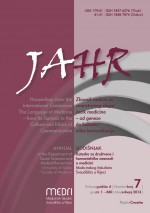Loša komunikacija i druge liječničke pogreške
Keywords:
loša komunikacija, liječničke pogreške, upravljanje pogreškamaAbstract
Numerous scientific revelations and discoveries make the technological development of medi-cine possible. The methods of medical treatment are becoming more and more efficient and the percentage of success in medical practice higher and higher. Unfortunately, there is a constant rise of alienation, misunderstanding, lack of consent and even conflict between the physician and the patient. Bad communication is (more than often) the reason behind the confrontation between the two. The perception of the same from the patient’s point of view is equally impor-tant. A form of communication that is "ill" is one of the most frequent mistakes that makes it possible for other mistakes to occur, human and/or technical. If a patient does not receive an apology or at least an explanation regarding something that has happened, bad communication could motivate him/her to press charges against a healthcare institution or its employee.The problem of different perspectives, understanding and definition of a mistake is warned about in and during taking care of work. Is it a complication, side-effect, accident, negligence, malpractice? It is the author’s goal for the mistakes to be viewed as an opportunity to enhance the quality of medical practice and to prevent any future mistakes from happening. By do-ing so, the relationship between the physician and the patient would get to a higher, more satisfying level.
Downloads
Published
Issue
Section
License
Authors who publish with this journal agree to the following terms:
- Authors retain copyright and grant the journal right of first publication with the work simultaneously licensed under a Creative Commons Attribution License that allows others to share the work with an acknowledgement of the work's authorship and initial publication in this journal.
- Authors are able to enter into separate, additional contractual arrangements for the non-exclusive distribution of the journal's published version of the work (e.g., post it to an institutional repository or publish it in a book), with an acknowledgement of its initial publication in this journal.
- Authors are permitted and encouraged to post their work online (e.g., in institutional repositories or on their website) prior to and during the submission process, as it can lead to productive exchanges, as well as earlier and greater citation of published work (See The Effect of Open Access).



